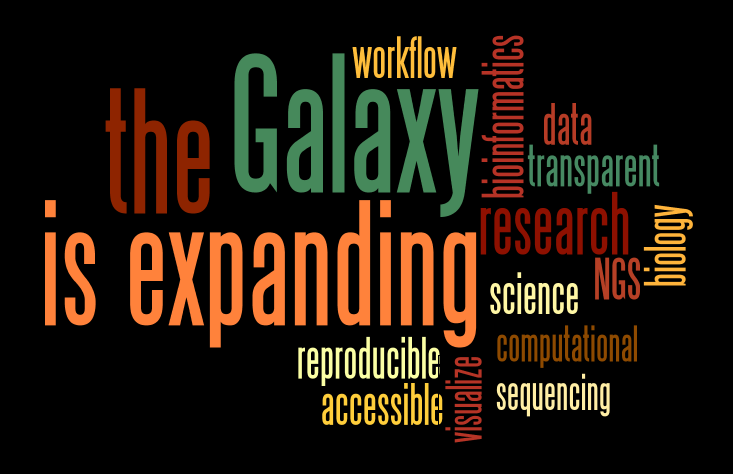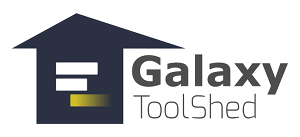September 2017 Galaxy News
 ](/galaxy-updates/)
](/galaxy-updates/)
Welcome to the September 2017 Galactic News, a summary of what is going on in the Galaxy community. If you have anything to add to next month's newsletter, then please send it to outreach@galaxyproject.org.
New Publications
122 new publications referencing, using, extending, and implementing Galaxy were added to the Galaxy CiteULike Group in August.
Some highlights from the recently added pubs:
- 2017 Galaxy community update Dan Blankenberg, Jeremy Goecks. F1000Research In 2017 Galaxy Community Conference, Vol. 6 (2017), doi:10.7490/f1000research.1114388.1
- Approaches for small RNA-seq in Galaxy Mallory Freeberg, James Taylor. F1000Research In 2017 Galaxy Community Conference, Vol. 6 (2017), doi:10.7490/f1000research.1114423.1
- Bio-Docklets: virtualization containers for single-step execution of NGS pipelines Baekdoo Kim, Thahmina Ali, Carlos Lijeron, Enis Afgan, Konstantinos Krampis. GigaScience, Vol. 6, No. 8. (August 2017), pp. 1-7, doi:10.1093/gigascience/gix048
- Building an open, collaborative, online infrastructure for bioinformatics training Bérénice Batut, Galaxy Training Network, Dave Clements, Björn Grüning. F1000Research In 2017 Galaxy Community Conference, Vol. 6 (2017), doi:10.7490/f1000research.1114447.1
- Galaxy-compatible Tool for Rapid Aptamer Clustering and HT-SELEX Data Analysis Nikita A. Skrylnik, Asian Journal of Pharmaceutics (AJP), Vol. 11, No. 02. (2017), doi:10.22377/ajp.v11i02.1265
- Hack the Galaxy report Anthony Bretaudeau, Frederik Coppens, Hack the Galaxy Participants. F1000Research In 2017 Galaxy Community Conference, Vol. 6 (2017), doi:10.7490/f1000research.1114391.1
- Integrative analysis of hundreds of datasets in Galaxy Geir K. Sandve, Boris Simovski, Sveinung Gundersen, Diana Domanska, Christin Lund-Andersen. F1000Research In 2017 Galaxy Community Conference, Vol. 6 (2017), doi:10.7490/f1000research.1114523.1
- Making Galaxy user Interface Pluggable with Webhooks Evgeny Anatskiy, Anup Kumar, Helena Rasche, et al. F1000Research In 2017 Galaxy Community Conference, Vol. 6 (2017), doi:10.7490/f1000research.1114475.1
- mzML2ISA & nmrML2ISA: generating enriched ISA-Tab metadata files from metabolomics XML data Martin Larralde, Thomas N. Lawson, Ralf J. M. Weber, et al. Bioinformatics (07 April 2017), doi:10.1093/bioinformatics/btx169
- PhageTerm: a tool for fast and accurate determination of phage termini and packaging mechanism using next-generation sequencing data Julian R. Garneau, Florence Depardieu, Louis-Charles C. Fortier, David Bikard, Marc Monot. Scientific reports, Vol. 7, No. 1. (15 August 2017), doi:10.1038/s41598-017-07910-5
- Pulling the Galaxy's strings Jeffrey Miller, Brenna Miller. F1000Research In 2017 Galaxy Community Conference, Vol. 6 (2017), doi:10.7490/f1000research.1114436.1
- Recent object formation in the core of Galaxy Martin Čech, et. al. F1000Research In Bioinformatics Open Source Conference 2017, Vol. 6 (2017), doi:10.7490/f1000research.1114483.1
- Systematically linking tranSMART, Galaxy and EGA for reusing human translational research data Chao Zhang, Jochem Bijlard, Christine Staiger, et al. F1000Research, Vol. 6 (16 August 2017), 1488, doi:10.12688/f1000research.12168.1
- The backbone of research reproducibility-sustainable and flexible tool deployment Björn Grüning, John Chilton, Johannes Köster, Dale Ryan, Yasset Perez-Riverol. F1000Research In Bioinformatics Open Source Conference 2017, Vol. 6 (2017), doi:10.7490/f1000research.1114482.1
- ToolDog-generating tool descriptors from the ELIXIR tool registry Kenzo-Hugo Hillion, Ivan Kuzmin, Hedi Peterson, Jon Ison, Hervé Ménager. F1000Research In 2017 Galaxy Community Conference, Vol. 6 (2017), doi:10.7490/f1000research.1114473.1
- wft4galaxy: a workflow testing tool for galaxy Marco E. Piras, Luca Pireddu, Gianluigi Zanetti. Bioinformatics (24 July 2017), doi:10.1093/bioinformatics/btx461
Publication Topics
| # | Tag | # | Tag | # | Tag | # | Tag | |||
|---|---|---|---|---|---|---|---|---|---|---|
| 62 | methods | 27 | usepublic | 17 | workbench | 14 | tools | |||
| 13 | isgalaxy | 10 | refpublic | 10 | usemain | 9 | reproducibility | |||
| 4 | project | 4 | cloud | 3 | uselocal | 2 | other | |||
| 2 | unknown | 2 | howto | 2 | visualization |
Upcoming events
There are a plenitude of Galaxy related events coming up in the next few months:
See the Galaxy Events Google Calendar for details on other events of interest to the community.
Who's Hiring

The Galaxy is expanding! Please help it grow.
- Ingénieur en développement de composants Galaxy pour l’Ecologie, Station de Biologie marine, Concarneau, France
- Galaxy Project is hiring software engineers and postdocs at Johns Hopkins, Baltimore, Maryland, United States
- Ingénieur spécialisé en NGS, BIOGECO, Bordeaux, France
- Bioinformatics Research Associate, Huttenhower Lab, Harvard School of Public Health, Boston, Massachusetts, United States
Got a Galaxy-related opening? Send it to outreach@galaxyproject.org and we'll put it in the Galaxy News feed and include it in next month's update.
Takeru Galaxy
 ](http://www.nabe-intl.co.jp/seq/takerugalaxy.html)
](http://www.nabe-intl.co.jp/seq/takerugalaxy.html)The Takeru Galaxy server is offered by NABE3 International, a manufacturer specializing in Linux-based clusters based in Tsukuba, Japan. Takeru Galaxy servers come as a fully configured (hardware and software) system featuring numerous standard biomedical analysis tools and reference genomes, all available in a Galaxy server. Customization and multiple support options are available.
Takeru Galaxy is the newest of many commercial support options for Galaxy.
Tools
ToolShed Contributions
 ](http://toolshed.g2.bx.psu.edu/)
](http://toolshed.g2.bx.psu.edu/)Tool Shed contributions in August.
Releases
nebulizer 0.4.2
Command-line utilities to help with managing users, data libraries and tools in a Galaxy instance, using the Galaxy API via the Bioblend library.
CAVEAT nebulizer is still a work in progress; please exercise caution when attempting irreversible operations especially against production Galaxy instances (for example when creating users or data libraries).
CloudBridge 0.3.3
CloudBridge aims to provide a simple layer of abstraction over different cloud providers, reducing or eliminating the need to write conditional code for each cloud. It is currently under development and is in an Alpha state.
Earlier Releases
Planemo 0.41.0 - 0.44.0
 ](https://pypi.python.org/pypi/planemo/)
](https://pypi.python.org/pypi/planemo/)Planemo is a set of command-line utilities to assist in building tools for the Galaxy project. These releases included numerous fixes and enhancements.
See GitHub for details.
galaxy-lib 17.9.0-3
galaxy-lib is a subset of the Galaxy core code base designed to be used as a library. This subset has minimal dependencies and should be Python 3 compatible. It's available from GitHub and PyPi.
This set of revisions includes:
- Bring in latest Galaxy dev changes.
- Implement support for building Singularity mulled containers.
- Implement mulled version 2 package hashing.
- Fix default namespace for mulled operations from mulled to biocontainers.
gops 1.1.0
The Galaxy Operations Python Package now provides utilities for working with GFF files thanks to @bgruening and @nsoranzo.
Other packages that have been released in the prior 4 months.
May 2017 Galaxy Release (v 17.05)
The Galaxy Committers published the 17.05 release of Galaxy in May.
Galaxy Docker Image 17.05
The Galaxy Docker project has seen a new release, following Galaxy 17.05. Major features are an additional Docker compose setup with SLURM and HT-Condor deployments, BioContainers integration and much more automatic testing.
And
- The Galaxy Docker Project has reached more than 23k downloads on Dockerhub - not counting quay.io and all flavors
-
From John Chilton:
- Awesome new mode for docker-galaxy-stable by Björn Grüning: container scheduling with Condor
Parsec 1.0.0
Parsec is a newly released set of command-line utilities to assist in working with Galaxy servers. It uses automatically generated wrappers for BioBlend functions. Manage histories, launch workflows, and more, all from the command line. The README includes several examples.
BioBlend 0.9.0
BioBlend is a Python library for interacting with CloudMan and Galaxy‘s API. BioBlend makes it possible to script and automate the process of cloud infrastructure provisioning and scaling via CloudMan, and running of analyses via Galaxy.
See the release notes for what's new in release 0.9.0.
Galaxy CloudMan 17.05 on AWS
A new release of Galaxy CloudMan is available on the Amazon Web Services cloud infrastructure. This release includes Galaxy 17.05, an updated tool list, and Slurm configuration changes to improve job performance. To get started, vist https://beta.launch.usegalaxy.org/ or take a look at the Getting Started guide.
CloudLaunch
Technically, the all-new Galaxy CloudLaunch service has been in public beta since February but keep in mind that it will replace the current CloudLaunch service eventually so give it a try and let us know how it performs for you.
And the rest ...
Other Galaxy packages that haven't had a release in the past four months can be found on GitHub.
Other News
 ](http://galaksio.readthedocs.io/en/latest/)
](http://galaksio.readthedocs.io/en/latest/)- Galaksio, an easy to use GUI for running Galaxy workflows. (And there is a video too.)

